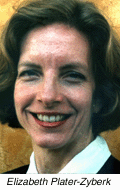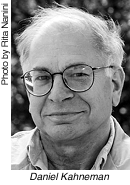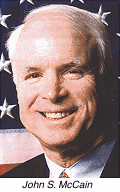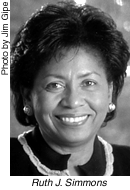
COMMENCEMENT 2001: Sketches of the Honorary Degree
Recipients
DOHERTY | DUANY | PLATER-ZYBERK | KAHNEMAN | McCAIN | SIMMONS | BACCALAUREATE
Peter C. Doherty, Ph.D.
Dr. Peter Doherty trained originally as a veterinarian and has spent the majority of his career as a research immunologist working on the nature of the host response to pathogenic viruses. With Rolf Zinkernagel, Dr. Doherty received the Nobel Prize in Physiology or Medicine in 1996 for the discovery of how the immune system recognizes virus-infected cells. This work, one of the most important discoveries of the past 30 years, has laid a foundation for an understanding of general mechanisms used by the cellular immune system to recognize both foreign microorganisms and self molecules.
This discovery is highly relevant to clinical medicine, relating both to efforts to strengthen the immune response against invading microorganisms and certain forms of cancer, and to efforts to diminish the effects of autoimmune reactions in inflammatory diseases, such as rheumatic conditions, multiple sclerosis and diabetes. In addition to the Nobel Prize, Dr. Doherty has been awarded the Paul Ehrlich Prize, the Gairdner Foundation International Award, and the Albert Lasker Medical Research Award.
He is chairman of immunology at St. Jude Children's Hospital and is a professor in the Department of Pathology at the University of Tennessee. He served as Associate Professor/Professor at the Wistar Institute (1975-1982), and was a member of Penn's Department of Pathology and the Immunology Graduate Group. He has authored or collaborated on more than 350 research papers and book chapters and has received honorary degrees from ten institutions.
DOHERTY | DUANY & PLATER-ZYBERK | KAHNEMAN | McCAIN | SIMMONS | BACCALAUREATE
 Andrés M. Duany,
FAIA and Elizabeth Plater-Zyberk, FAIA
Andrés M. Duany,
FAIA and Elizabeth Plater-Zyberk, FAIA
Andrés Duany and Elizabeth Plater-Zyberk are internationally distinguished architects who pioneered the consultative public process of urban design and founded "The New Urbanism" movement, which has sought to end suburban sprawl and urban disinvestment by revolutionizing the way cities are viewed and redeveloped. They founded the firm, Duany Plater-Zyberk & Company Town Planners and Architects (DPZ), which crafted the master plan to create the town of Seaside, Florida, hailed by Time magazine as "the most astounding design achievement of its era."
Largely credited with inspiring a new sense of excitement and relevance about the power of urban design, Professors Duany and Plater-Zyberk have taught and lectured widely on architecture's role in shaping communities and on the threat that suburban sprawl poses to the future of our human and natural habitats. Professor Duany authored a chapter on urban planning that appeared in the ninth edition of Architectural Graphic Standards, as well as articles on history and theory in various journals. He has also contributed articles to the Lexicon for the New Urbanism, a manual for urban design. He is a founding member and member of the Board of Directors of the Congress for the New Urbanism, established in 1995 to reform urban growth patterns. He received his undergraduate degree in architecture and urban planning from Princeton, and after a year of study at the École des Beaux Arts, he received his master's degree in architecture from Yale.
Elizabeth Plater-Zyberk is Dean of the University of Miami School of Architecture, where she has taught since 1979. She is a member of Princeton's Board of Trustees; she received her undergraduate degree in architecture and urban planning from Princeton and her master's degree in architecture from Yale.
DPZ has received numerous awards, including two State of Florida governor's Urban Design Awards for Excellence. With Jeff Speck, Professors Duany and Plater-Zyberk co-authored the book Suburban Nation: The Rise of Sprawl and the Decline of the American Dream.
DOHERTY | DUANY | PLATER-ZYBERK | KAHNEMAN | McCAIN | SIMMONS | BACCALAUREATE
Daniel Kahneman, Ph.D.
Daniel Kahneman, Eugene Higgins Professor of Psychology and Professor of Public Affairs at Princeton's Woodrow Wilson School, is one of the most influential and important social scientists of our time. His pioneering collaboration with Amos Tversky in the field of human decision concluded that people are generally inconsistent in their attitudes to risk and will often make mathematically irrational decisions. When reasoning or making decisions, we place great value on rules of thumb, or heuristics, and biases, Drs. Kahneman and Tversky concluded. This research has become central to natural and social science textbooks, and has also influenced fields such as economics, marketing, the social sciences, law, and political science.
Dr. Kahneman's research has also explored the valuation of public goods, which addresses such public policy questions as assessing Exxon's financial liability for harming the Alaska coast after the Valdez oil spill. Dr. Kahneman has also discovered novel and valuable ways to study pleasure and pain scientifically. The results are particularly important in medical decision making. Throughout his career, Dr. Kahneman, imaginatively and creatively, has studied important issues that had presented major methodological problems for other psychologists and social scientists. For his groundbreaking work in psychology, he has received some of the most prestigious awards in the field, including the Distinguished Scientific Contribution Award of the American Psychological Association, the Warren Medal of the Society of Experimental Psychologists, and the Hilgard Award for career contributions to General Psychology.
DOHERTY | DUANY | PLATER-ZYBERK | KAHNEMAN | McCAIN | SIMMONS | BACCALAUREATE
 John S. McCain
John S. McCain
John McCain--naval aviator, U.S. Congressman and U.S. Senator from Arizona--has set an inspirational standard for courage, integrity, and patriotism during more than 40 years of service to his country.
The son and grandson of prominent Navy admirals, John McCain graduated from the U. S. Naval Academy in 1958 and began a 22-year career as a naval aviator. In 1967, he was shot down over Vietnam and held as a prisoner-of-war in Hanoi for five and a half years, much of it in solitary confinement. In 1981, he retired from the Navy as a Captain. Cpt. McCain's naval honors include the Silver Star, Bronze Star, Legion of Merit, Purple Heart and Distinguished Flying Cross. His best-selling memoir, Faith of My Fathers, depicts his early life, his military career, and his experience as a POW in the infamous and wretched "Hanoi Hilton."
Following his ordeal, John McCain resumed his military service for nine years before launching his political career in 1982, when he was elected for the first of two terms to represent Arizona in the U.S. House of Representatives. In 1985, he was elected to the Senate, and was re-elected to a third term in 1998 with nearly 70% of the vote.
Widely popular among Democrats, independents, and minority voters in his home state, Senator McCain has won national recognition as a voice for tax reform and campaign finance reform. He has fought a determined and often solitary campaign against pork barrel spending and been a long-time advocate of a strong national defense, the line item veto, deregulation, and free trade. He has also become one of Congress' leading defenders of the rights of Native Americans.
Senator McCain is Chairman of the Senate Committee on Commerce, Science and Transportation. He has received numerous awards from taxpayer and foreign policy organizations for his distinguished public service and conservative leadership. In 1997, he was named one of the "25 Most Influential People in America" by Time magazine.
In 2000, he challenged George W. Bush for the Republican presidential nomination, winning several key primaries, including New Hampshire, Michigan, Arizona, Vermont, Connecticut, and Michigan, before conceding the nomination to Mr. Bush. He continues today to fight for reform as a maverick in the United States Senate.
DOHERTY | DUANY | PLATER-ZYBERK | KAHNEMAN | McCAIN | SIMMONS | BACCALAUREATE
Ruth J. Simmons, Ph.D.
Ruth J. Simmons is a gifted educator and leader who has won national acclaim for her efforts to open higher education--particularly elite private institutions--to students from all economic, racial, and ethnic backgrounds. In July, she will become the first woman president of Brown University and the first African American to head an Ivy League university, after completing a six-year presidency at Smith College, where she established the first engineering program at a women's college.
A native of Texas and a 1967 graduate of Dillard University in New Orleans, Dr. Simmons received the Ph.D. in Romance languages and literatures from Harvard in 1973. She has been a member of the faculties of the University of New Orleans, California State University Northridge, Spelman College and Princeton. While a faculty member, her teaching and research interests centered primarily on literature of Francophone Africa and the Caribbean.
In 1983, after serving as Associate Dean of the Graduate School at the University of Southern California, Dr. Simmons joined the Princeton administration. She remained at Princeton for seven years, leaving in 1990 for two years to serve as Provost at Spelman College. She returned to Princeton in 1992 as Vice Provost. In 1993, invited by the President to review the state of race relations on the Princeton campus, Dr. Simmons wrote a report that resulted in a number of initiatives that received widespread attention.
Dr. Simmons is the recipient of several prizes and fellowships, including a German DAAD and a Fulbright Fellowship to France. More recently, she has received the Centennial Medal from Harvard, the Medal of Distinguished Service from Columbia's Teachers College, and the National Urban League Leadership Award. In 1996, Dr. Simmons was named a CBS Woman of the Year, an NBC Nightly News Most Inspiring Woman, and a Glamour Magazine Woman of the Year. She is the author of numerous publications, including a chapter in True to Ourselves: A Celebration of Women Making a Difference, published by the League of Women Voters in 1998.
She is a member of the National Academy of Arts and Sciences, the American Philosophical Society, and the Council on Foreign Relations.
DOHERTY | DUANY | PLATER-ZYBERK | KAHNEMAN | McCAIN | SIMMONS | BACCALAUREATE
Almanac, Vol. 47, No. 27, March 27, 2001